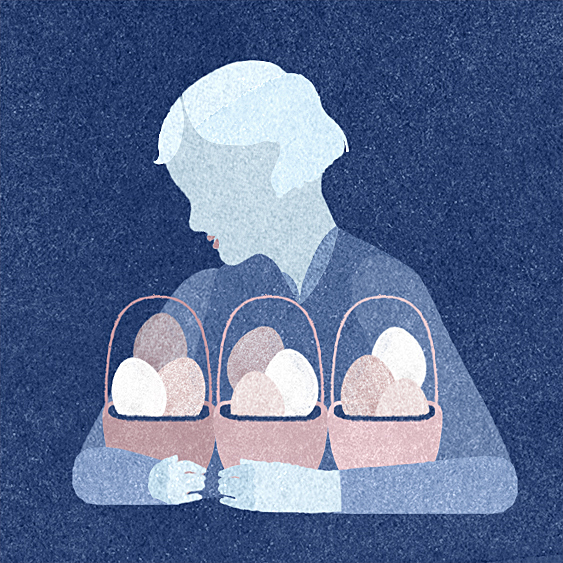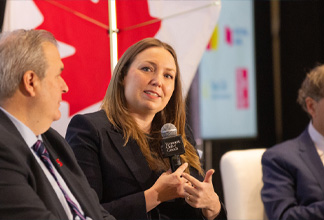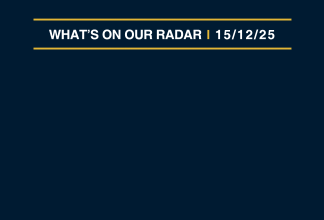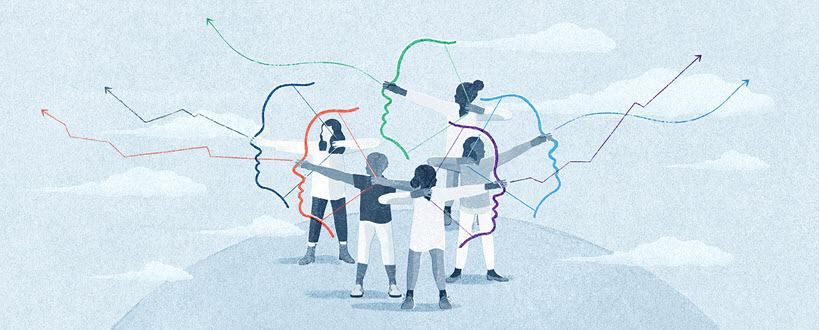Investing Journeys: 5 Women Share Their Stories
Written by The Content Team, RBC Direct Investing
Published on March 2, 2018
minute read
Share:
International Women's Day, celebrated for the first time by the United Nations in 1975, is all about empowering women. It's a day to recognize globally the social, economic, cultural and political achievements of women, and fuel the drive toward gender parity.
In recognition of this year's International Women's Day, on March 8, we turned to five women to talk investing. Their stories encompass first trades gone awry, self-discovery, self-confidence, an education savings "ah-ha" moment and the perils of getting caught up in market hype.

Sticking to her eco-friendly values.
Taran, 28*
How long have you been investing?
It's been just over a year. Right after I got out of university and started my first job, I met a colleague who loved investing in the stock market and always had insightful things to say about it.
Tell us about an investing experience you learned from.
Growing up in a single parent family home with my mother and three sisters, we didn't talk a lot about investing. I always believed it was something that was very complex. After graduating with a business degree, I decided I wanted to challenge myself to learn all I could about investing.
When I first started trading, I was fortunate to have made a couple of lucky investment choices in my TFSA (Tax-Free Savings Account); lucky is the key word here because the companies I was investing in were actually quite speculative and I hadn't really done my homework. I learned the importance of doing my due diligence and proper research after I found out a company I had purchased stock in had signed a contract for a project that wasn't environmentally friendly. I know it may sound silly, but this was a deal-breaker for me.
The experience was actually quite humbling because it made me realize what type of investor I am. I learned I'm not someone looking to make quick money; I want to buy shares in companies I believe in. I truly believe that when I align my personal values with my investments, not only am I staying true to myself but I'm also contributing to the success of a company that shares the same values as me.
What's your biggest takeaway from your experience?
The moral of my investment journey so far is to be sure to do my due diligence before buying a stock so I can be sure my personal values align with those of the companies I'm investing in. (Which can help ease the pain of some of those days my stocks are in the red!)

Looking out for the next best investment.
Paula, Mid 40s*
How long have you been investing?
Aside from the Canada Savings Bonds my parents would buy for me on special occasions as a kid, I started on my own in my early 20s when I got my first full-time job. Full disclosure: I had no idea what I was doing. But I knew I should be setting aside a bit of each paycheque and was able to take advantage of a matching contribution program my company offered.
Tell us about an investing experience you learned from.
This one's about RESPs (Registered Education Savings Plans), and it's one I've been kicking myself over. My husband and I started an RESP when our first child was around five or so. We opened a family plan, which allowed us to cover our second child as well, who was four years younger. Our oldest just started University this year (yay!), but we realized too late in the game (when he was already 18) that we hadn't contributed enough each year to get the full $7,200 in grant money we could have gotten from the government. We only ended up with about two-thirds of it. Free money that we totally left on the table because we really hadn't taken the time to fully understand RESPs.
Luckily, we've got just enough time to realize the full grant (the Canada Education Savings Grant) for our second son thanks to the catch-up feature. We can use unused grant room from previous years, but it means we have to double up our contributions to his RESP until he turns 17 in order to make it happen.
What's your biggest takeaway from your experience?
Dig in! It's important to get started, but once you start, don't stop there. The Internet can be your best friend when it comes to investing products and account types. And don't get overwhelmed – pick one thing you want to learn about -- in my case it was RESPs -- and just start reading.

Making calculated investment decisions.
Logan, 24*
How long have you been investing?
I started investing the moment I turned 18. My dad was the one who encouraged me to open a TFSA (Tax-Free Savings Account) and helped me learn the basics.
Tell us about an investing experience you learned from.
I consider myself very risk averse and I like steady growth and cash flow that's relatively secure. Still, I got caught up in some recent market hype. In January, I decided to spontaneously put some money into a company that I hadn't done any research on. I just decided on a whim because, well, "everyone" was doing it. I was very wrong. One day in and I was down half my initial investment. It was an eye-opening experience actually because all my prior purchases yielded positive results.
Since I don't like to admit defeat, I am still holding it even though I am down so much. I'm hoping there will be an up wave in the market so I can sell when I am close to breaking even.
What's your biggest takeaway from your experience?
I don't regret my decision because I actually learned a lot from it. It made me realize that I should just stay true to my own risk tolerance and continue to make trades based on my research -- not just because it's the hot topic of the day. I have a specific investment goal and I should stick to it. I'll continue to pick an industry, do my research, crunch the numbers, and decide whether it's a wise investment for my style or not.

Making sure all her eggs aren't in one basket.
Sylvie, Early 50s*
How long have you been investing?
I've been investing for about 30 years. I began working at an investment dealer in 1986 when the bull market was raging and making money looked easy. It was a very exciting time. I worked as a sales assistant for a few brokers and got licensed to place trades and work with clients.
Tell us about an investing experience that you learned from.
My experience through bull and bear markets has strongly shaped me. The most important thing I've learned is that market values fluctuate, so you can't bet the farm on a certain outcome. Here's what I mean…
I was there when stock markets around the world plunged on Black Monday (October 19, 1987), sharply changing my perspective. I didn't own any stocks of my own yet, but the crash made me cautious. It took until around the mid-90s for me to feel ready to buy my first stock. I knew I wanted something "safe," so I only focused on blue chip stocks and looked for steady-as-she-goes companies that paid dividends and grew over time. I bought Nortel.
By the early 2000s (around the dot-com bubble bust), the shares of Nortel collapsed after the company missed its revenue target, and the once-tech giant eventually went bankrupt. I lost all of my hard-earned money. I devoted myself to learning everything I could about investing, but for years later, recalling the sting of the loss, I still couldn't bring myself to buy another individual stock.
What's your biggest takeaway from your experience?
I learned that as much as stocks can go up, they can go down. And because we can't control where the market goes, I like to take a portfolio approach to investing. I don't concentrate my investments in just one or two stocks, but prefer to be diversified and have a smart mix of investments. I also know my limitations. I know I don't have the time to do the research to pick my own individual stocks, so instead I buy select mutual funds and ETFs. I only just recently made my first stock purchase since my Nortel debacle. I'm hoping for the best!

Wearing a stylish jacket with a portfolio collar.
Kerri, Early 30s*
How long have you been investing?
Six years. I started small through a retirement plan with my first employer. It wasn't until I was working for an asset-management firm that I started to actively invest in ETFs (exchange-traded funds) outside of the company retirement plan. By my mid-20s, I had slowly started to contribute to a TFSA (Tax-Free Savings Account) and an RRSP (Registered Retirement Savings Plan).
Tell us about an investing experience you learned from.
Earlier this year, once I felt comfortable with the overall value of my portfolio, I used some extra cash to invest in a marijuana ETF. I did it to broaden my investing experience, and for the chance of achieving higher returns (which luckily I was successful in doing).
This was my first investment in 'speculative investments' and the volatility made me very nervous. The longest amount of time I was invested was two months and I sold my position on extremely volatile days in the markets. Now I currently only own only two single stocks. One is the stock of my employer, and the second is a Canadian company that I am familiar with through research and industry knowledge, including its management team, mission, business plan, etc.
The bulk of my portfolio is invested in broadly diversified ETFs and some factor (or smart beta) ETFs. You could call it a core satellite approach. I use indexed ETFs to build the core of my portfolio, with exposure to markets like Canada, U.S., emerging markets, etc. And then a smaller portion of 'satellites' are invested in ETFs with a little bit more risk.
What's your biggest takeaway from your experience?
Now that I know volatility makes me uncomfortable, going forward only a small portion of my portfolio will be invested in highly volatile assets. Also, after six years of working in the financial industry, a couple of lessons have hit home. Know yourself and have a plan. And the earlier, the better! I've also realized that a plan doesn't necessarily mean I'm able to predict the future; it's the process of understanding what I'm comfortable with, what's important to me and an idea of how I'll get there.
*Names and identifying details have been changed to protect the privacy of individuals.
RBC Direct Investing Inc. and Royal Bank of Canada are separate corporate entities which are affiliated. RBC Direct Investing Inc. is a wholly owned subsidiary of Royal Bank of Canada and is a Member of the Investment Industry Regulatory Organization of Canada and the Canadian Investor Protection Fund. Royal Bank of Canada and certain of its issuers are related to RBC Direct Investing Inc. RBC Direct Investing Inc. does not provide investment advice or recommendations regarding the purchase or sale of any securities. Investors are responsible for their own investment decisions. RBC Direct Investing is a business name used by RBC Direct Investing Inc. ® / ™ Trademark(s) of Royal Bank of Canada. RBC and Royal Bank are registered trademarks of Royal Bank of Canada. Used under licence. © Royal Bank of Canada 2018. All rights reserved.
The views and opinions expressed in this publication are those of the writer. This article is for your general interest and does not necessarily reflect the views and opinions of RBC Direct Investing. Furthermore, the products, services and securities referred to in this publication are only available in Canada and other jurisdictions where they may be legally offered for sale. If you are not currently resident of Canada, you should not access the information available on the RBC Direct Investing website.
Explore More

7 Ways to Get Ahead Financially in 2026
How you might invigorate your finances and put your money to work more intentionally this year
minute read

Economic Outlook: Uncertainty is Here to Stay, So What's Next?
Takeaways from the Economic Club of Canada’s Annual Event
minute read

3 things: Week of December 15
What the Inspired Investor team is watching this week
minute read
Inspired Investor brings you personal stories, timely information and expert insights to empower your investment decisions. Visit About Us to find out more.







